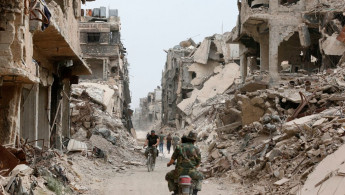Russian soldiers prevent Palestinians visiting graves in Syria's war-ravaged Yarmouk refugee camp
Russian soldiers in the Syrian capital Damascus prevented Palestinians in the Yarmouk refugee camp from visiting the graves of relatives over the Eid al-Fitr holiday, which ended last Saturday, the Action Group for Palestinians of Syria (AGPS) reported.
Activists told the UK-based rights group, which monitor the situation of Palestinians in Syria, that Russian troops and Assad regime intelligence officers set up roadblocks on streets leading to the old Martyrs’ Cemetery in Yarmouk Camp.
The Yarmouk Camp, where over a hundred thousand Palestinian refugees used to live before the Syrian conflict broke out in 2011, lies south of the Syrian capital Damascus and was captured by Syrian rebels and pro-opposition Palestinian fighters in 2012.
It was subjected to a starvation siege by the Assad regime and after that overrun by the Islamic State group in 2015, before being captured by the regime in May 2018.
Read more: The erasure of Yarmouk - How the Assad regime is dismantling Syria's hub of Palestinian life
Eyewitnesses confirmed that Russian officers were seen in the old cemetery, preventing people from entering to visit the graves of loved ones. Palestinian officials and relatives of the dead were able to visit a newer cemetery, according to reports.
The activists said that the Russian troops might have been deployed to the cemetery to find the possible remains of Israeli soldiers who previously disappeared in Lebanon during Israeli interventions in that country.
In April 2019, the Syrian regime handed over the remains of an Israeli soldier missing since the 1982 Israeli invasion of Lebanon to Israel.
The AGPS has previously reported that Syrian regime and Russian troops were digging up Palestinian graves in the old cemetery in Yarmouk to find the remains of Israelis.
The Martyrs’ Cemetery was severely damaged during regime bombing of the Yarmouk Camp. Following its capture by regime forces, the Palestine Liberation Organization (PLO) began clearing the rubble in surrounding streets to make it accessible.





 Follow the Middle East's top stories in English at The New Arab on Google News
Follow the Middle East's top stories in English at The New Arab on Google News


